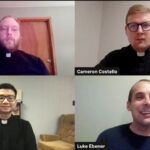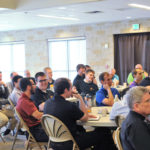By Barb Arland-Fye
A dusty, nearly 70-year-old rosary and equally dusty military ID tag arrived in a package in the mail and filled Pat Schmida of Wellman with gratitude. Her husband, Milton, the owner of the long-missing belongings, is ill with cancer. They treasure their Catholic faith and long life together. The items of faith and service, lost but now found, remind them of the many blessings along their pilgrim journey. “I’m so grateful (the package) came when it did,” Pat said.
Two years ago, with the world still reeling nine months into the COVID-19 pandemic, Pope Francis gave a catechesis on prayer, specifically, the prayer of thanksgiving. His message is timely year-round but especially as we prepare to celebrate Thanksgiving Nov. 24, followed three days later by our entrance into Advent.
The Holy Father began his catechesis with the episode of the Cleansing of the Lepers (Luke 17:11-19) and how 10 were healed but only one returned to give thanks. “This narrative, so to speak, divides the world in two: those who do not give thanks and those who do; those who take everything as if it is owed them, and those who welcome everything as a gift, as grace. The Catechism says: ‘every event and need can become an offering of thanksgiving (n. 2638).’”
We give thanks through our practice of gratitude. The Eucharist, which takes its name from the Greek word meaning “thanksgiving,” commits us to reciprocate Jesus’ gift of his body and blood by going out into the world to give of ourselves to others, especially the least among us.
Students, alumni and staff of the Newman Catholic Student Center in Iowa City are giving thanks for the center’s role in their lives throughout November by taking actions as simple as writing a message on a whiteboard and posting it on social media. These messages point to something deeper, a grounding in Christian encounter that inspires thankful recipients to express gratitude through their actions beyond the center and University of Iowa campus. Alumna Julia Waters, for example, is serving as a FOCUS missionary in Ohio.
Members of the St. Ambrose University community likewise are expressing gratitude this month, which they call “Bee the Difference Month.” Students, faculty and staff began with an afternoon of service Nov. 6, an event inspiring 30 days of intentional payer and service, to encourage reflection and gratitude. They follow the example of the university’s namesake, St. Ambrose of Milan who said, “No duty is more urgent than that of returning thanks.”
Pope Francis, in his general audience talk Dec. 30, 2020, told listeners “This ‘thank you’ we must say continually, this thanks that Christians share with everyone, grows in the encounter with Jesus.” Furthermore, “if we are bearers of gratitude, the world itself will become better, even if only for a little bit, but that is enough to transmit a bit of hope. The world needs hope.”
In his series on the new Missal (2011), Deacon Frank Agnoli wrote that during the Preface and Holy, Holy, “we recall the past (God’s gift of self) with gratitude as we focus on the historical and glorified Body of Christ.” The Preface, he wrote, highlights the particular reasons for our gratitude. He suggested entering more intentionally into the prayer by offering a silent “thank you” after each of the sentences or phrases in the Preface that mentions a cause for thanksgiving.
So, for example, the presider prays: “It is truly right and just, our duty and salvation, always and everywhere to give you thanks, Father most holy, through your beloved Son, Jesus Christ, your Word through whom you made all things.” Our response: “Thank you — for the gift of Creation whom you sent as our Savior and Redeemer.”
For Your Marriage, an initiative of the U.S. Conference of Catholic Bishops (USCCB), offered suggestions for developing a disposition of gratitude, which is applicable to all people (https://tinyurl.com/36y7bsj3):
• Pray a brief prayer of thanksgiving upon waking. Tell the Lord the things we’re grateful for in our daily prayer time.
• In our hearts, say, “Thank you, Lord” throughout the day.
• Internalize gratitude by memorizing one of the many psalms of thanksgiving.
• Make it a point to thank family members (and others) for the ways that they tend to our needs.
Donald Demarco, writing in Catholic Education Resource Center, offers another take on gratitude, based on an action that President Abraham Lincoln took in 1863, during the American Civil War. To “remind his fellow countrymen of their need to thank God and reestablish their friendship with Him, he proclaimed a national day of ‘humiliation, fasting, and prayer.’” Lincoln “knew that a weakened relationship with God inevitably meant a weakened relationship with neighbor. The Civil War was ample testimony to that fact,” Demarco said (https://tinyurl.com/56tt4ant).
We may not be inclined to fast on Thanksgiving but as people of faith we are compelled to pay our gratitude forward in corporal works of mercy: feeding the hungry, giving drink to the thirsty, sheltering the homeless, visiting the sick, visiting prisoners, burying the dead and giving alms to the poor. The USCCB website provides practical examples for carrying out these works of mercy in our homes and communities (https://tinyurl.com/bdz9ttpm).
The dusty rosary and ID tag, displayed in a box on a sofa table in Pat and Milton Schmida’s home, provide a daily reminder of faith and service that guide their family’s expression of gratitude in their interactions with one another. Thank you, God.
Barb Arland-Fye, Editor
arland-fye@davenportdiocese.org












